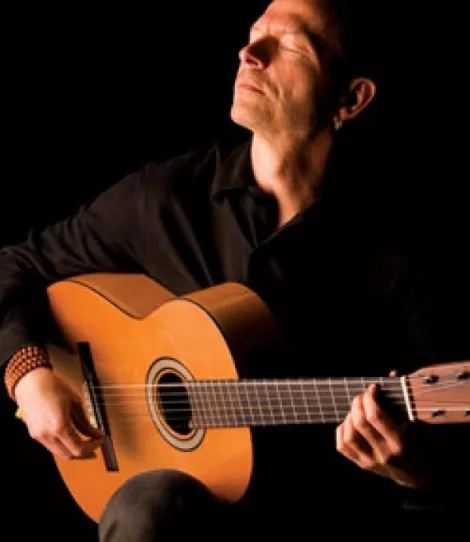
Born in Cologne, Germany, his father Chinese-German, his mother Hungarian, Liebert says he doesn’t have one particular culture that he comes from. “I’m interested in seeing how things fit together globally.”
That interest has served him well up to now. His album Nouveau Flamenco, which he recorded in 1989 after a year of flamenco guitar classes, sold two million in the United States alone.
The mariachi, flamenco, bossa nova and pop mix spawned a new genre in new flamenco, while helping to introduce flamenco greats like Paco de Lucia to the American public. It also earned the wrath of some flamenco purists, outraged at how little respect they claimed Liebert showed to the form or knowledge he displayed. Whatever the purists thought, Liebert nevertheless had an impact in flamenco’s country of origin. Music from Nouveau was featured on Spanish news shows and bullfight programs.
Liebert understands why some might have been irritated. “Spanish broadcasting accepting music from some guy in America, who only knew a few flamenco forms and was obviously new to the whole thing. ...”
Seventeen years and 20 CDs later, his distinctive long flowing hair is gone and the musical influences, once more apparent, are now woven so tightly into his most recent CD One Guitar that listeners who attend his two concerts this coming weekend at the Alta Club and Memorial House will be hard-pushed to pick out much. There are hints of flamenco, of bossa nova, but they’re buried so deep in Liebert’s lithesome structures you barely notice them. “What I want to do is make something seamless, not obvious,” he says.
He is a 21-year resident of Santa Fe, N.M., where in 20 minutes, he says, “You can be on Santa Fe ski mountain walking above the clouds.” The layout of this land seems to hold the biggest influence over his music. There’s a spaciousness, an intensity to the sound of One Guitar that evokes deserts and mountains. But there’s also at times an almost aching sense of concentration, of focus on a note, on the plucking of a string, the source of which might just as well come from his long-standing commitment to meditation.
Certainly, it’s Zen Buddhism that brings him to Salt Lake City, since his two local performances benefit the Kanzeon Zen Center. Liebert is a monk of Zen Master Dennis Genpo Merzel. This is the second time Liebert has appeared on behalf of his roshi or teacher. The last time, in 2005, Kanzeon’s publicity manager Cindy Atkins recalls he insisted on the chairs being gathered in a half moon around a tiny stage. “Ottmar likes the audience to be close,” she says. “It’s very moving to see him play. He displays a lot of emotion in his face.”
While song titles such as “Letting Go” and “Beginnings Not One Not Two” reflect his Buddhist interests, she argues, Liebert is more interested in increasing audience accessibility to his music, rather than narrowing it with particular associations.
“I try not to be overly explicit,” he says. “Everyone should have their own interpretation.”
Although Liebert has toured with his three to nine-piece jazz-flamenco band Luna Negra since the 1990s, he is relatively new to solo acoustic performing. “At first I wasn’t sure either myself or the audience would enjoy it,” he says. What makes One Guitar for him his best record is the flow of its ideas. He credits 70 percent of it to improvisation. But whether or not he would have that same flow of ideas playing live was another matter. “There’s a certain amount of letting go, of putting your pants down and being naked on stage,” he says about playing solo acoustic live.
Accompanying his guitar work are photographs taken on his travels on different continents. “I had more training in art than in music,” he says. Projecting 700 images from his laptop, one every nine seconds, while playing is like “watching TV with the sound off and listening to Pink Floyd,” he adds.
Critical of instrumental music that is little more than guitar parts strung together, he prefers to build his tracks around simple chorus melodies. While the choruses make his instrumentals fluid, he’s also apt to explore intricate structures around them. “Music without words has to be a little more evocative,” he says. He wants listeners who view instrumental music as no more than background music, to “dive into it and give it your own translation.”
Some translation is already provided through titles such as “Night Traveling Raindrops,” the track’s chorus a gorgeous re-creation of listening to the rainfall. It was named by a German fan from Bavaria. “This Spring Release 10,000 Butterflies” was a Liebert title. He wrote that song for Genpo’s dharma successor Diane Hamilton. When they met a few months after he finished it, she said she’d been dreaming of butterflies all the previous month. “One of those weird occurrences,” he says.
But even Liebert can come up with the odd dud for a title. The opening track on his best-selling Nouveau Flamenco is titled “Barcelona Nights.” His original title for what he describes as oompah bass and rumba strumming?
“Horny Pony.”
OTTMAR LIEBERT @ The Alta Club, 100 E. South Temple, Friday, Nov. 9, 7 p.m.
Memorial House, 485 N. Canyon Rd (Memory Grove), Saturday, Nov. 10, 7 p.m., 328-8414